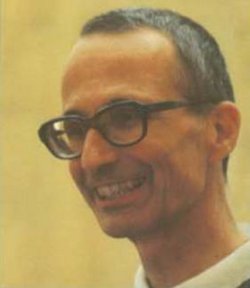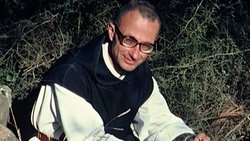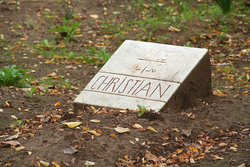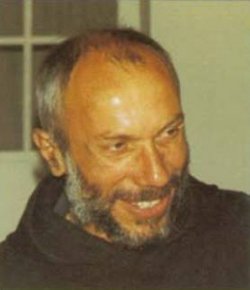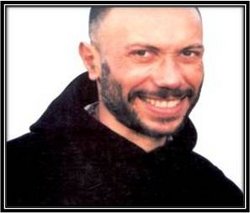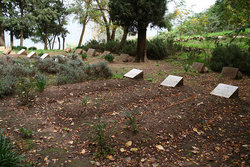| Birth: | Jan. 18, 1937 |
| Death: | May 21, 1996 |

Dom Christian de Chergé OCSO., fifty-nine years old, was the Father Prior of the Cistercian - Trappist Monastery of Our Lady of Atlas in Algeria. He was one of the Seven Trappist Monks who died by assassination at the hands of terrorists on May 21, 1996. Entering Atlas in 1969, and made his Novitiate at the Abbey of Aiguebelle.
Father Christian's first experience of Algeria was growing up in that country as a child for three years while the 1939 war raged in Europe. One of his brothers tells that at that time Christian was impressed by the way in which Muslims prayed to God: "Our mother never ceased saying to him that they prayed to the same God as he did." Early impressions and love for Algeria were revived and reinforced much later during twenty-seven months of national service in the middle of the Algerian war of independence. It was during this period that his love of Algeria became rooted and the rest of his life marked by an experience he had. He was posted in a village of the Special Administrative Section. He had made friends with a young Algerian rural policeman. One evening they were walking together when they were attacked by some nationalists of the FLN. The young Algerian interposed his body to protect Christian, and they got away. The young Algerian had saved his life, but two days later his body was found with his throat cut. Christian never forgot this incident.
Christian, born in 1937, was the son of a distinguished French general. In this family of the old French nobility he and his seven brothers and sisters were formed in the active practice of their religion. At an early age he became aware of his vocation, and at twenty he entered the Séminaire des Carmes in Paris. "From the beginning," recounts a contemporary and friend, Claude Bressolette, "one was impressed by his natural distinction and reserve. Little by little, behind the smile and the gentle regard, one discerned what I can only call an elegance of heart." He recalls that friendship was the subject of their dissertations, and that Christian's had great spiritual depth.
This gift of making friends characterized his relations within his extended family and led to ever widening contacts and friendships within the Cistercian Order. He was invited to share his experiences with the Monks and Nuns directing Novices in France. He spoke every Sunday by phone to his friend, Dom Étienne Baudry of Bellefontaine, during those last critical months. He had a special affinity with the Community of Latroun because of their common Arab - Muslim context. In 1984, he attended the General Chapter in Holyoke, USA., and he made new friends among American Monks, for he spoke English in addition to French and some Arabic. He wrote to Abbot John Eudes Bamberger of Genesee for his feast day: "This is a good occasion for a big thank you for all the attention and kindness you showed me during the General Chapter. I have often said since then that thanks to you and through you I have discovered another image of 'America' and the echo of the same authenticity in a very different economic and cultural context." He had been elected Prior of Tibhirine earlier that year. His regular correspondence with the abbot general shows his great feeling for the Cistercian Order. His letters to Dom Bernardo chronicle the deepening community consensus and commitment in the years leading to the Monks' martyrdom.
Christian was a contemporary of Vatican II. He assimilated the theological insights of the great dogmatic and pastoral constitutions. He was a man with a sense of the Church, and after ordination in 1964, he served as Chaplain to the school of the Sacré-Coeur de Montmartre. He had good relations with Cardinal Marty. There was affection, humor, and simplicity in their exchanges. When Fr. Christian felt the time had come and that he had satisfied his obligations to the archdiocese of Paris, he obtained from Cardinal Marty approval to follow his long-cherished calling to Algeria. Visits to the Benedictine Abbey in Morocco since 1961, had helped him to acquire a better understanding of and a better rapport with the land and its people. In his desire to deepen his dialogue he had been studying Arabic and taking every opportunity to meet people with known sympathy for the country of his choice.
Isolated in Islamic territory, the Monastery at Tibhirine depended on Monks' coming from other Communities. The case of Fr. Christian was different. His first choice was to be accepted for Our Lady of Atlas, although it was necessary to make his Monastic Novitiate at Aiguebelle. Besides monastic formation he received encouragement to study the Arabic language and culture for two years with the White Fathers in Rome before he finally settled into the unique role in Islamic-Christian dialogue that came to distinguish his monastery. He actively supported and shared in the Ribât association of dialogue and friendship between the two faith communities. After a lapse of such meetings, Christian invited the group to meet again at Tibhirine in March 1996. For Christian this dialogue was no passing interest. It became the perspective of a wide and deep love. "It is a sort of 'microclimate,'" he said in an address to the General Chapter of 1993, "which frees our faith from all human respect and false reserve. Moreover, there are those values that animate Islam and which we also ordinarily expect to find among monks." Menaced more than ever by being invaded by an armed band on Christmas Eve 1993, Christian felt impelled to compose a letter to the terrorist chief. In it he referred to those common religious values and his one desire to remain in the country of his love:
Our state as Monks binds us to God's choice for us, which is prayer and the simple life, manual work, hospitality, and sharing with everyone, especially the poor...We are very conscious of having received much from Algeria and through her, from this Islam which prompts believers to emulate good actions until the day of the Lord. If, some day, Algerians judge that we are not wanted, we shall respect their desire and leave with very much regret. I know that we would continue to love them all, together, and you among them.
His own preferential choice was to reside there always, with the daily prayer on his lips, "Lord, disarm me and disarm them." Fr. Mounios, the Parish Priest at Médéa, vividly recalls: "He was a man with a fine bearing and of remarkable intelligence. Thanks to his finesse he quickly adapted himself to the local people."
By his bedside after his abduction there was found the book of Sheik Khaled Bentounès, "Le Soufisme, Coeur de Islam". Br. Paul had just brought the book the evening before. It would have been Christian's last reading, in his quest to the end for unity. The book reflects the spirit of the friends of Islam and those who continue in the hope "that we would make our journey together towards God and towards man. This is the urgent concern God has given to us today, and we all pray for it." |
|
Burial:
Our Lady Of Atlas Monastery, Médéa
Algiers, Algeria
Plot: Monastery Grounds. |
Created by: Eman Bonnici
Record added: Dec 11, 2010
Find A Grave Memorial# 62787607 |
|
|
| |




